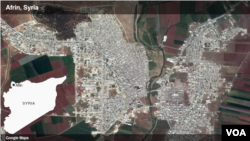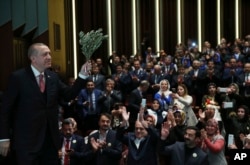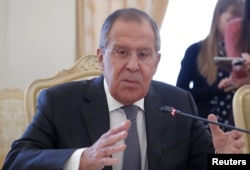Pro-Syrian government forces reportedly have crossed into the Kurdish-held enclave of Afrin. The deployment is in response to an ongoing military offensive by Turkish-led forces against the YPG Syrian Kurdish militia.
"The Syrian government responded to the call of duty and they sent military units today, Tuesday, 20 February, 2018, to be deployed along the borders and to be involved in defending the unity of Syrian territory," said YPG spokesman Nuri Mahmoud.
Ankara claims the convoy of several hundred heavily armed fighters was forced to retreat after coming under Turkish artillery fire.
Turkish President Recep Tayyip Erdogan sought to play down the incident, claiming the fighters belonged to local militias that were acting on their own, without Damascus's support. Erdogan added the "matter was closed for now."
Damascus has not commented on the incident.
The forces being deployed to Afrin are believed to be made up of Syrian government and Iran-backed militias, including elements of Hezbollah. Unverified videos circulating on social media show heavily armed forces, including armored cars and tanks, being sent to the Kurdish enclave. One fighter reportedly declared, "We are coming for Erdogan."
Russia, Iran consulted
Erdogan said Tuesday he had warned his Russian counterpart, Vladimir Putin, in a telephone conversation Monday that Damascus would "face serious consequences" if it sent its forces to Afrin in support of the YPG militia. On Monday, Syrian state TV reported Damascus had reached an agreement with the YPG to deploy forces to secure Afrin.
In a speech to parliamentary deputies Tuesday, Erdogan declared Afrin's main town, also called Afrin, would be put under siege in the "coming days." Erdogan also claimed after speaking to his Iranian and Russian counterparts he had thwarted an agreement between Damascus and the YPG to support the Kurdish militia against the Turkish incursion.
Last month, Ankara launched its military offensive into Afrin against the YPG militia, which it accuses of being linked to a decades long Kurdish insurgency in Turkey. Erdogan has pledged the operation would continue until the militia is removed from the enclave.
Damascus has opposed the operation, calling it a violation of its territorial integrity and pledged to resist it, but until now has not taken action.
"I don't think Ankara and Damascus are so eager for a direct confrontation," said Metin Gurcan, a Turkish defense analyst. "But the real danger, is that Turkey has the Free Syrian Army proxies and Assad has too pro-Assad militia. Those proxies have this bloody feud with one another, a clash is possible between them."
Russia calls for talks
The rising tensions pose a major headache for Russia. Moscow is a strong backer of the Assad regime, but at the same time sees Ankara as crucial to its ongoing efforts to bring an end to the Syrian civil war because of Turkey's strong ties with Syrian rebel forces.
Russian Foreign minister Sergey Lavrov said Tuesday the situation in Syria's Afrin could be resolved only through direct dialogue between Damascus and Ankara.
Erdogan has ruled out any dialogue with Assad, claiming it is impossible to speak with a man responsible for the deaths of a half-million people. Analysts argue it is a key strategic goal of Moscow to open dialogue between Ankara and Damascus in its ongoing efforts to end the civil war.
The risk of Ankara and Damascus-backed forces sliding into a direct confrontation could force Moscow into choosing sides, given it controls Syria's airspace and currently allows Turkish jets to support the ongoing offensive in Afrin.
"The Turkish operation — with jets, tanks and howitzers — has been possible so far due to the indirect support of Russia, the main ally of the al-Assad regime, together with Iran," Murat Yetkin wrote Tuesday in the Turkish daily Hurriyet.
Ultimately, Moscow could have the most at stake in the rising Turkish-Syrian tensions.
"Russia, at the end of the day, needs both Damascus on the one side of the table, and Ankara, to control the Sunni armed opposition and to turn them into a political actor, to maintain the political transformation process," noted analyst Gurcan. "I don't think Moscow will let the destruction of this very fragile, very complex negotiating table which it has been constructing for more than one year."













